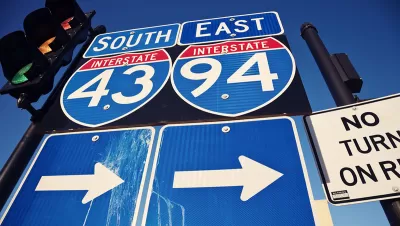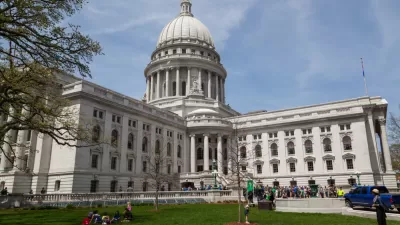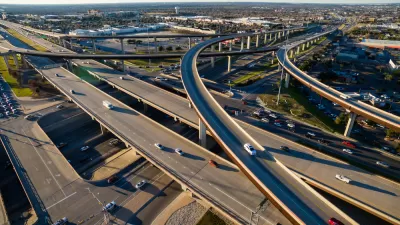A plan to save money on highway megaprojects is likely to backfire, experts warn.

Amid much controversy out of the Wisconsin Capitol this month, one wonky transportation bill has escaped the limelight: a requirement that highway megaprojects be funded with a minimum of 70 percent federal dollars.
Federal funding, of course, comes with federal requirements—specifically, the requirement to pay contractors the federal prevailing wage. The new law's goal, according to transportation experts interviewed by Wisconsin Public Radio, is "to concentrate federal funds into fewer highway projects," thereby limiting the total number of state projects that would have to pay a higher wage. Governor Walker signed the bill along with several others passed in the recent lame-duck session.
But multiple state offices, including the Wisconsin Department of Transportation, have concluded that it's not clear that avoiding prevailing wage would actually save the state money on transportation projects. Moreover, advocates say the requirement could end up delaying major projects and repairs that aren't able to achieve majority federal funding. Read or listen to the full story at Urban Milwaukee.
FULL STORY: Lame-Duck Bill Changes Highway Funding

Planetizen Federal Action Tracker
A weekly monitor of how Trump’s orders and actions are impacting planners and planning in America.

The Simple Legislative Tool Transforming Vacant Downtowns
In California, Michigan and Georgia, an easy win is bringing dollars — and delight — back to city centers.

San Francisco's School District Spent $105M To Build Affordable Housing for Teachers — And That's Just the Beginning
SFUSD joins a growing list of school districts using their land holdings to address housing affordability challenges faced by their own employees.

In More Metros Than You’d Think, Suburbs are Now More Expensive Than the City
If you're moving to the burbs to save on square footage, data shows you should think again.

The States Losing Rural Delivery Rooms at an Alarming Pace
In some states, as few as 9% of rural hospitals still deliver babies. As a result, rising pre-term births, no adequate pre-term care and "harrowing" close calls are a growing reality.

The Small South Asian Republic Going all in on EVs
Thanks to one simple policy change less than five years ago, 65% of new cars in this Himalayan country are now electric.
Urban Design for Planners 1: Software Tools
This six-course series explores essential urban design concepts using open source software and equips planners with the tools they need to participate fully in the urban design process.
Planning for Universal Design
Learn the tools for implementing Universal Design in planning regulations.
Smith Gee Studio
City of Charlotte
City of Camden Redevelopment Agency
City of Astoria
Transportation Research & Education Center (TREC) at Portland State University
US High Speed Rail Association
City of Camden Redevelopment Agency
Municipality of Princeton (NJ)





























